Alaska Travel Blog
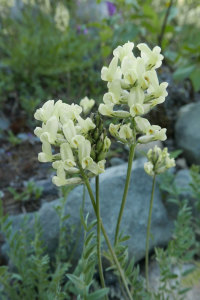
Yellow Oxytrope
25 days and 6,167 miles, from Oregon to Alaska and back again.
June 12, 2015 Bob and I loaded the truck tent on top of the bed of the truck, fit the gear like a puzzle into the bed of the truck, along with food for a month and headed to our first stop Vancouver, Canada to see our son.
Lines were short at the border crossing, but before crossing into Canada our eggs got confiscated because of the bird flu in Oregon. I forgot to tell the border agent that the eggs were actually from Texas.
Since our final destination was Alaska we drove through Canada as fast as we could…6 day’s fast! Canada is very large! We averaged about 6 to 7 hours of driving a day, which left little time to explore except at the occasional campground.
In the push to the Alaskan border we had no problem finding fuel and for the most part, with a few exceptions, the roads were very good with only scattered areas where we had to follow a lead car to get through road works. The weather stayed cool everywhere with the nights getting into the low 50’s and on occasion in the 40’s. I pulled out the super warm sleeping bag for those nights. For most of the nights we just used Big Agnes’s down blanket with an alpaca blanket for covers.
Red Bluff Provincial Park, next to the largest natural lake in British Columbia, was our first campsite. We were the only occupants in the campground except for the mosquitoes. The cottonwoods were shedding their fluffy white seeds, which made the ground look snow covered. A few seeds hitched a ride on our tent for the duration of the trip.
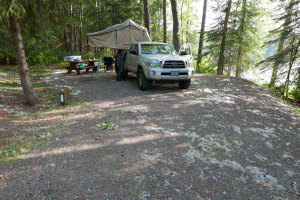
Red Bluff Campground, ground covered in cottonwood seeds.
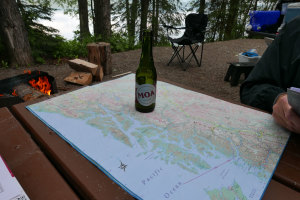
First night a long way to go still
On our way to the next campground we passed through stunning country; pine and deciduous forests, lakes and rivers, snow capped mountains and the Cambria Ice field. Mt. Shadows Campground on the edge of Kinaskan Lake in Iskut, BC. was our next destination. The mosquitoes followed us to this place as well as rain…however after this campground we really had very little mosquito issues. Driving to this campground we saw our first moose and black bear.
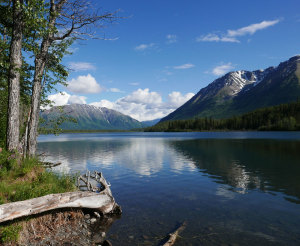
Kinaskan Lake at Mt. Shadow Campground
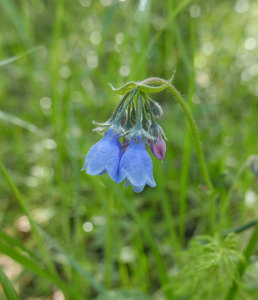
Bluebells
Entering the Yukon Johnson Crossing was the next stop, once a historic trading post, now a small lodge with restaurant and campground. They actually had vegetarian options… something hard to find in Canada. It was raining so we opted for a room for the night rather than opening up an already damp tent.
Cottonwood Campground on the Kluane Lake in the Yukon was our final stop before crossing the border. Across the road from the campground was the Shakwak Kluane Mt. area with some hiking areas. We took that opportunity to get some exercise in after days and hours of driving and hiked up the Slims River and to a ridge for some great views of the lake and mountains. I also added to my plant list, as there were many blooming in the area.
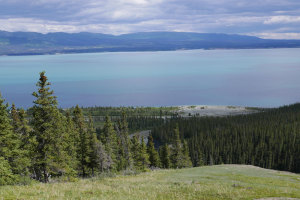
Looking down on the campground and Kluane Lake
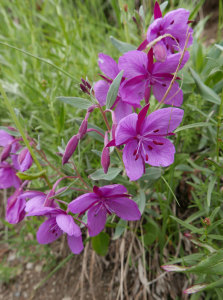
June 19th… On our way to the border we saw a grizzly on the side of the road. I mention this as it would be the best sighting of a grizzly we would see the entire trip. We passed unscathed through the USA/Canada border crossing and were immediately greeted with smoky skies and a very bumpy road. Some 200 fires were burning in Alaska, several of which were in the areas we had planned to visit.
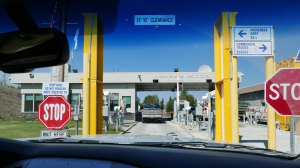
Canada/Alaskan border
Tok was our next overnight on our way to Chitina where we were catching a plane to Kennicott. While waiting for the plane we wandered down to the Copper River, which ran along side the runway. Some fishermen were fishing using an old Indian method of catching fish by using two large rotating baskets pushed by the water. The fish would get caught in the baskets, scooped up and dumped into a holding container as the baskets are rotating in and out of the water. Pretty clever and a somewhat lazy way to fish!
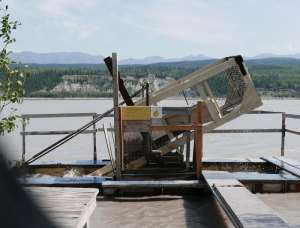
Device to use for catching fish on the Copper River
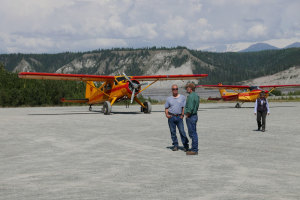
Planes to Kennicot
The plane arrived and pulled into the dirt parking lot. 45 minutes and spectacular mountain and glacier scenery later our little Cessna loaded with 5 people and luggage landed at another dirt runway at McCarthy. A van took us to Kennicott where we checked into the lodge. Kennicott is an old copper mine founded in the 1903 . www.nps.gov/wrst/learn/historyculture/Kennecott-mines-national-historic-landmark.htm. The mill and village sit right next to a very large glacier. In the 1900’s the glacier was higher than the village next to it, but now the glacier is lower so that you can see the entire valley.
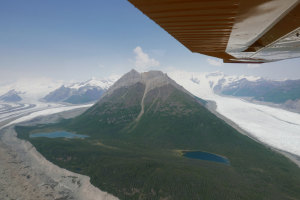
Kennicott glacier on the Left, Wrangell Mt middle, Root Glacier on the Right which flows alongside the Kennicott mine.
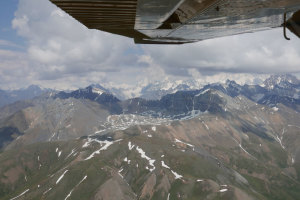
Wrangell Mt
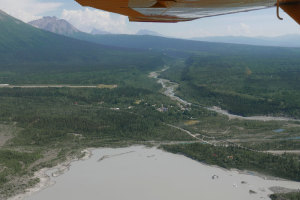
Landing strip at McCarthy, Kennicott in the distance
The National Parks took over this area of the Wrangell-St.Elias National Park and restored many of the buildings and is currently restoring part of the mill. Over the communal dinners we met people here from all over, Germany, Sweden, Taiwan, Switzerland, Netherlands, Israel, France, and England.
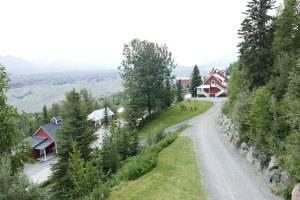
Lodge at Kennicott
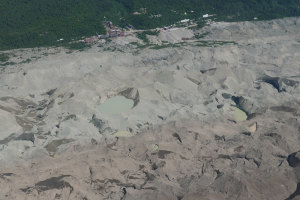
Root glacier next to Kennicott mill and village. It it covered in dirt at the base of the glacier near the moraine.
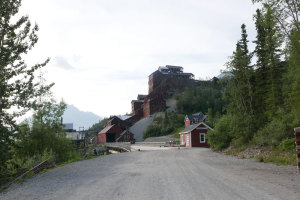
Kennicote Mill
From a ranger talk I learned more about the plants in this area and their uses and continued to add many more plants to my plant list. I did learn the Soapberry, Shepherdia canadensis , which there are lots of in the area, is the bear’s favorite food, so hiking in the fall could be dangerous to your health.
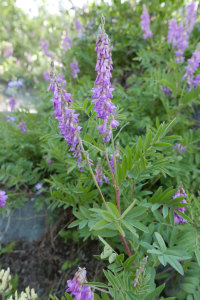
Eskimo potato, Hedysarum alpinum, the root can be eaten.
We spent 3 nights in Kennicott and used the time to do a fair amount of walking. Bob did a glacier walk and I did an 8-mile hike down to the glacier then up along the ridge next to it till I ran across fresh bear scat and decided this would be a good place to turn around and find a place to sketch. The next day we walked the old wagon road to McCarthy, which was a mistake as it was swarming with mosquitoes. We opted to rent bikes to ride the 5 miles back to Kennicott minus the mosquitos. McCarthy was the supporting town for Kennicott, which is still inhabited today. Some of the original buildings have been restored as well as a small museum documenting the mine and the people. The old photographs and the section on the early pioneering women were particularly interesting for me. Before leaving we enjoyed lunch at Roadside Potatohead, a small eatery filled with plastic Mister Potatoheads.
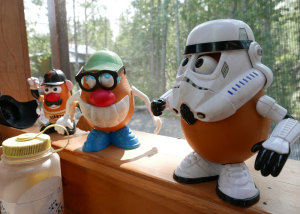
Roadside Potatohead restaurant
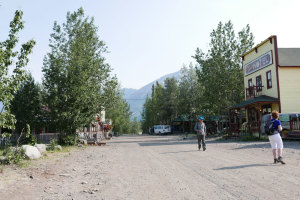
McCarthy Main st.
June 23 we caught the 8 am flight back to Chitina.
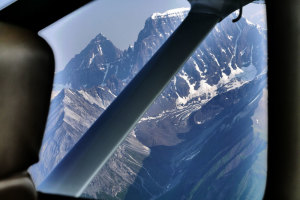
Tabletop Mt
The smoke and haze was the worst this day, we could not even see the surrounding mountains. We had a slightly bigger plane this time and only 4 people. It was an early morning flight so it was a smooth ride back to Chitina. Our truck was still waiting for us intact so off we went to the next stop, Quartz Creek Campground on Kenai Lake on the Kenai Peninsula. There were several fires burning in the area but the air at the campsite was clearer than it was at Kennicott. We attached the vestibule to the tent, which made it much easier to store our bags and change clothes and made it a bit warmer in the tent.
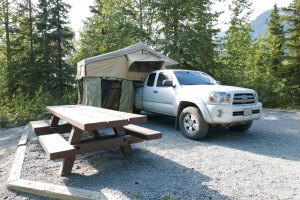
I think we are the only people on Kenai who never saw a bear or moose but we did see a vole and a weasel on the peninsula. No bears or spawning fish on our 8-mile hike along the Russian river trail, only seagulls poised on the rocks waiting for fish or anything tasty to snag for lunch.
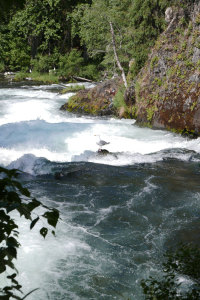
waiting seagull
We wandered down to Seward for a day and admired the murals they paint once a year on random buildings in the town. Every town should have murals on their buildings. On the way back to camp we did a quick 4-mile walk in the Crescent lake area Lots of plants, some birds but no big mammals. Our bear spray went unused!

Seward Mural
June 26 we left for Denali. We had to make a stop in Anchorage at Toyota to do a maintenance check then drive on up to the park. We were lucky to have a campground at Savage River Campground one of the few in the Park that you can drive to. We were near the Savage River and could hike along it for as far as we wanted. No worries about getting back before dark…24 hours of sunlight, which I thoroughly enjoyed and it did not affect my sleeping.
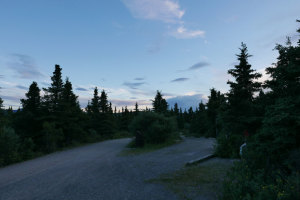
Midnight at Savage River Campground
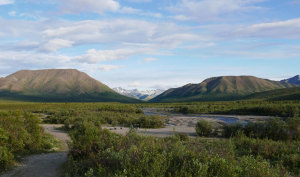
View from Savage River Campground, Savage River
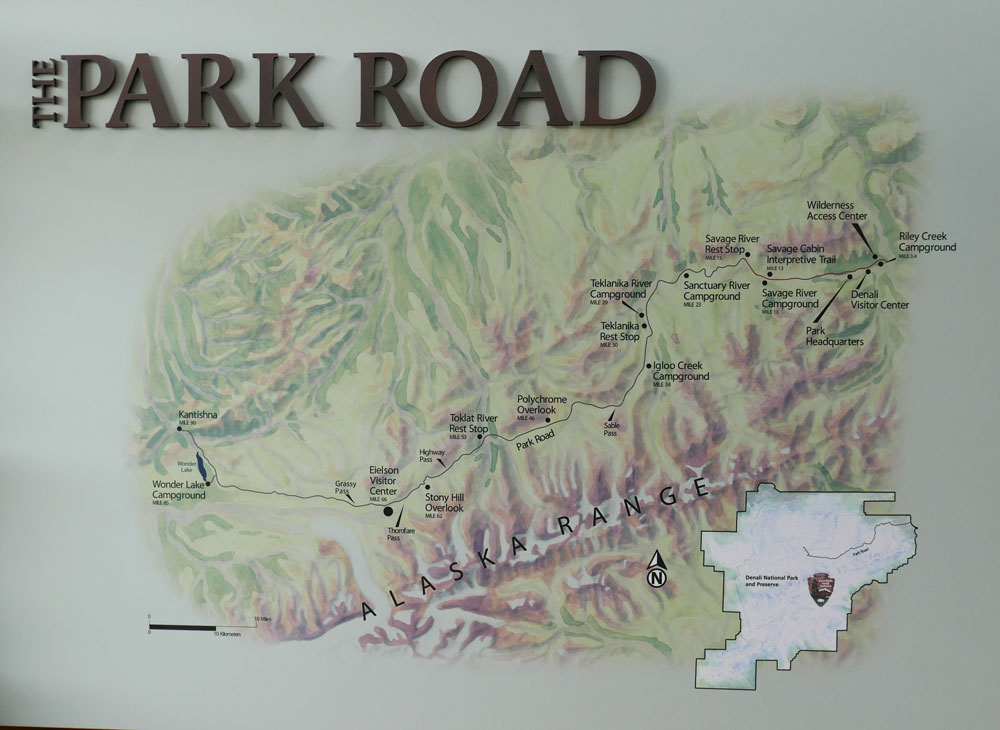
Park Road Map
In order to see the entire park we had to take one of their buses, which are nothing more than green school buses with very uncomfortable seats. We did the 11 hours round trip to Wonder Lake, stopping off at Teklanika, Toklat River, Eirelson Center, and finally Wonder Lake. The stops were mainly toilet stops so we got maybe 10 to 15 minutes at the most at each stop except for one, which was 40 minutes. No time to explore or sketch unless you departed the bus at some point and picked up another one at a later time…if there was room. We saw no animals going except a Ptarmigan and her babies and some caribou. Coming back grizzlies and dal sheep were few and far between or miles away. However the scenery was spectacular and I added more plants to the list.
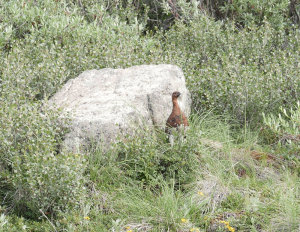
ptarmigan Alaska’s national bird
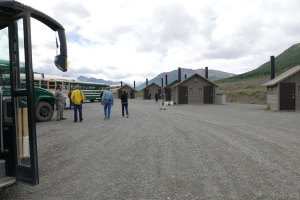
lots of toilets for lots of tourists

The next day we hiked the Alpine trail, a 4 mile 1200ft elevation gain, near the Savage River. We shared our lunch with a ground squirrel at the top before descending to the river.

looking down on our campsite at Savage river
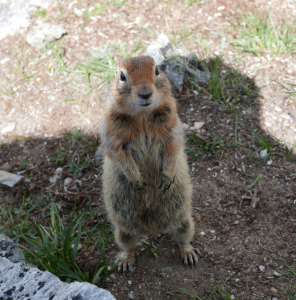
ground squirrel
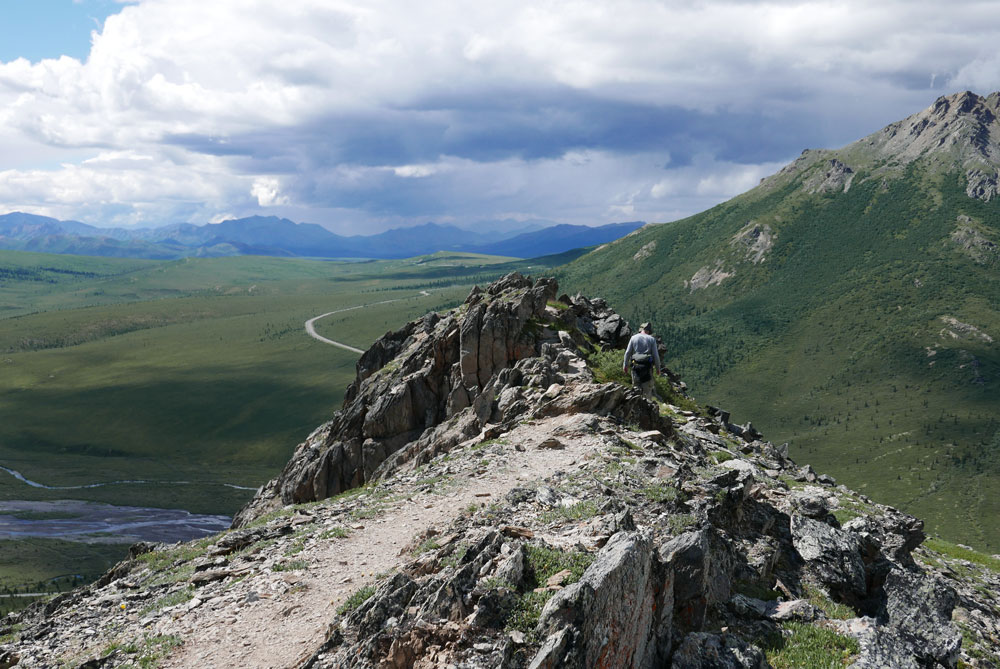
Alpine trail heading down to river. Park road in the distance.
June 29 we had to pack up and leave for Fairbanks. We did a last walk near the Savage River…I found even more plants I had not seen before. I was very sad to leave this area. I did get to see Mt. Mckinley on the last day at Savage Creek, only briefly before it was shrouded in clouds again.
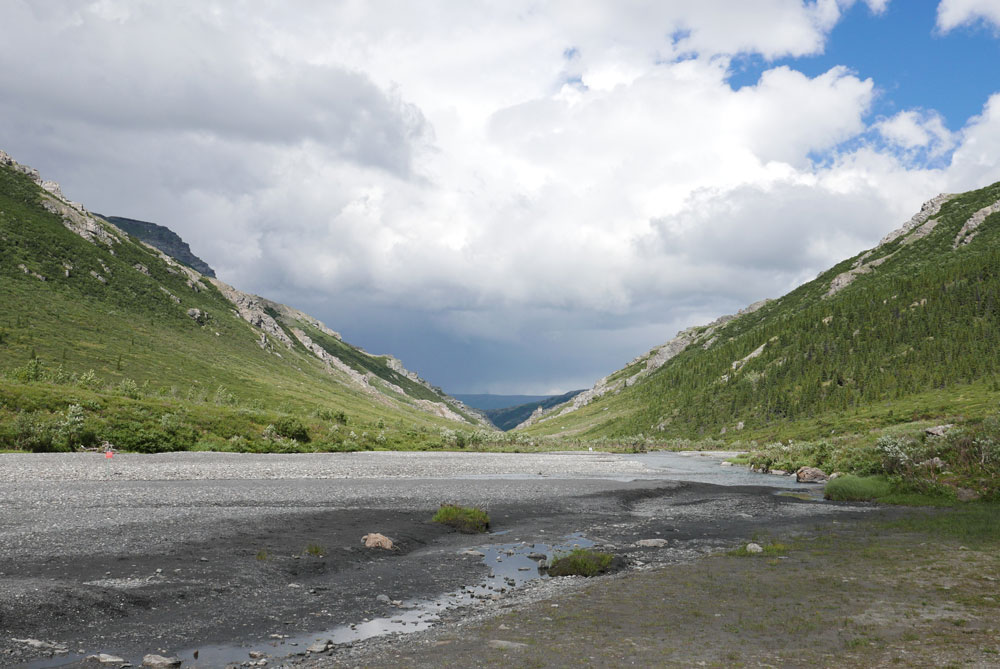
Our last stop in Alaska was the Chena Hot Springs resort for a dip in the hot spring pool before the long trek back to Oregon.
Driving back we encountered rain through the Yukon so we opted for a night at a hotel in Watson Lake instead of camping. Watson Lake has the distinction of the having its own very large Sign Forest. Cottonwood campground was the only campground we stayed at twice, the rest of the campgrounds we found on the way wherever we ended up at the end of the day. We took a detour through Whistler on our way back to Vancouver to see our son again…the road was quite high and windy and the air got smokier and smokier as we got near Vancouver. The air in Vancouver was very bad…burning my eyes and hard to breathe. The Women’s World Cup Soccer, USA against Japan, was also happening in the town so there were lots of red, white and blue painted faces of happy Soccer fans on the streets…USA won! It was quite hot in Vancouver as well which never happens, and apparently Vancouver’s buildings lack proper air conditioning…just air venting, so all the fans were sold out in the town.

Sign forest, Watson Lake
Anyone can put up a sign, any type of sign.
The next day 9 hours later we were back in Oregon.
I ended up with 58 plants on my plant list, not including some of the plants I saw but already knew.
(A side note: I had many more photos to add but I was having issues with downloading them , might be the new computer was not compatible with the original set up but if I can get it fixed I will add them later.)
- Saxifraga cernua
- Saxafraga hieracifolia
- Dwarfed Sedum rosa
- Willow sp
- Monensis uniflora
- Heracleum lanatum
- Saxifraga sp?
- Campanula sp.
- Dryas octopetala
- Epilobium angustifolium













Karen Atherton says:
Wow, you have have a great trip. Thanks for the pics and commentary. Can’t wait to see the resulting artwork. So glad you didn’t need the bear spray!
September 7, 2015 — 8:24 pm